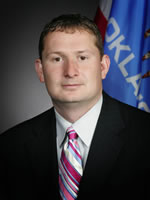Corn Re-Introduces Measure to Create Greater Fiscal Responsibility and Budget Stability
 Senator Kenneth Corn
Senator Kenneth Corn
Senator Kenneth Corn believes state government in Oklahoma cannot afford to repeat the mistakes of the past – going on a spending spree when times are good and, thus, creating a financial crisis when oil and gas prices drop. A bill filed by the Poteau Democrat would protect against the roller coaster budgeting that results from the cyclic nature of energy prices, Corn said Wednesday.
Senate Joint Resolution 5 calls for a constitutional amendment to be considered by state voters. It would require the certification of the 10-year average of gross production tax revenue from oil and natural gas, and limits Legislative appropriation of revenue above that average to one-time expenditures.
“This would prevent the Legislature from repeating the mistakes of the 1980s when the oil boom dramatically increased state revenues and, in turn, expenditures; leaving a huge hole in the state budget when the boom went bust,” Corn said.
The measure has been named the Fiscal Responsibility and Budget Stabilization Act.
Last year, for example, oil and gas revenues spiked to all-time highs. The Legislature simultaneously passed the largest tax cut in state history and the largest state budget ever.
“We can’t keep doing that and not expect to face a fiscal crisis in the future. Oil and gas prices have already dropped below their levels from last year and I expect we’ll have some tough budget decisions to make in the next session,” Corn said. “By limiting appropriation of gross production revenues above the 10-year average to one-time expenditures, we can provide greater stability in the state budget.”
Corn said under his proposal the excess gross production revenue could be spent on capital needs and things like highway maintenance and bridge replacement.
“This measure won’t allow the Legislature to use an unstable source of revenue to create new programs or expand old ones. That’s not fiscally responsible and my bill will allow the people to force some fiscal restraint on their elected leaders with a constitutional amendment,” Corn said.
The eight-year legislative veteran filed a similar measure last year.
 Oklahoma Senate
Oklahoma Senate

